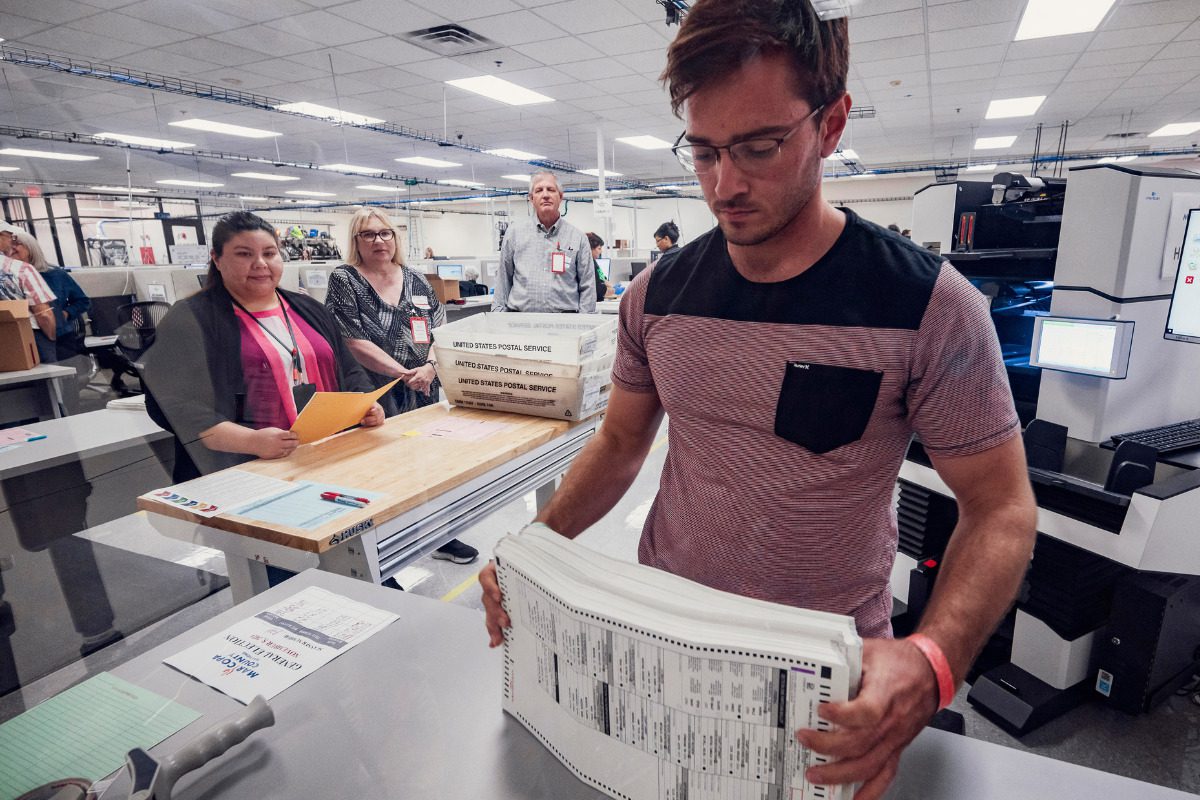
An election worker processes a stack of 2024 General Election ballots with the tabulation machine in front of observers from different parties at the Maricopa County Tabulation and Election Center (MCTEC) in Phoenix, Arizona, on October 23, 2024. Photo by Olivier Touron / AFP via Getty Images.
Citizens are able to legislate through ballot initiatives in Arizona. It’s also a way for the Arizona Legislature to bypass the governor and ask citizens to approve laws.
This year’s ballot had 13 initiatives left for all Arizonans to approve or reject. Props 139 and 140 were put on the ballot through citizen initiative, while the other 11 were put on the ballot by the Republican-majority Arizona Legislature.
Here’s how each fared in the 2024 election:
Prop 133 – REJECTED
Arizona voters chose not to move additional power to political parties and rejected Prop 133. As of Thursday morning, NO held the lead with over 97% of precincts reporting and over 2.2 million votes counted, according to the Arizona Secretary of State’s unofficial election results.
Political parties will not be able to solely determine who runs in primary elections, and potential candidates still need to gather signatures.
Voters rejecting Prop 133 also leaves the door open for ranked-choice voting in the future, as Prop 133 would have made it illegal.
Prop 134 – REJECTED
Arizonans chose to keep the current structure of power with ballot initiatives and rejected Proposition 134. NO held the lead as of Thursday morning with nearly 58% of the vote and over 97% of precincts reporting.
The Republican-majority Arizona Legislature’s attempt to make citizen ballot initiatives more difficult failed to pass, and citizen initiatives still require signatures from 10% of qualified voters from the last gubernatorial election, or 15% if the proposal requires a constitutional amendment.
Prop 134 would have transferred immense veto power of citizen initiatives to Arizona’s smallest counties, and voters decided to keep power equal across the entire state.
Prop 135 – REJECTED
Gov. Katie Hobbs and future governors won’t be impeded in future emergency situations, as Arizona voters rejected Proposition 135. As of Thursday morning, NO held the lead with nearly 57% of the vote after over 2.2 million votes were counted.
The Republican-majority Arizona Legislature sent this to the ballot as a response to former Gov. Doug Ducey’s use of emergency powers during the COVID-19 pandemic.
Prop 135 would have significantly curbed the governor’s future use of emergency powers.
Prop 136 – REJECTED
Arizonans rejected an attempt by the Republican-majority Arizona Legislature to curb their legislative powers by voting NO on Proposition 136. As of Thursday morning, nearly 62% of voters said NO to the measure with over 97% of precincts reporting.
Currently, the state constitution prohibits suing to keep citizen initiatives off the ballot. Laws put into place by Arizonans can only be checked by the judiciary after the fact, not before.
Prop 136 would have reduced the power of Arizonans to legislate and amend the state constitution.
Prop 137 – REJECTED
Arizonans rejected lifetime appointments for judges while keeping two Arizona Supreme Court justices who ruled in 2024 to bring back a Civil War-era abortion ban. NO held a massive lead on Proposition 137 with over 77% of the votes and over 97% of precincts reporting.
Prop 137 would have eliminated judicial retention elections for the Arizona Supreme Court, most county court jurisdictions, and the Arizona Court of Appeals.
It would have been retroactive, making any “no” votes against Arizona Supreme Court Justices Clint Bolick and Kathryn Hackett King invalid. Both King and Bolick retained their seats with just under 60% of voters voting YES on keeping them on the court.
The Republican-majority Arizona Legislature put Prop 137 onto the ballot seemingly as a way to protect the conservative majority, as there was an active campaign to remove Bolick and King.
Prop 138 – REJECTED
It seems like Arizonans don’t want to be paid less! Proposition 138 had one of the biggest gulfs between YES and NO of all measures on the ballot this year, with the vast majority voting NO.
Over 1.7 million voters voted NO on the measure as of Thursday morning, good enough for over 77% of the vote with over 97% of precincts reporting.
Tipped employees will likely maintain their current pay structure, and employers can pay tipped employees up to $3 less per hour if they can prove that tips make up the difference in pay.
Prop 138 aimed to change that so employers could change that $3 pay cut to pay employees 25% of the minimum wage.
Prop 139 – APPROVED
After years of uncertainty on the state of reproductive rights in Arizona, voters chose to constitutionally protect access to abortion. As of Thursday morning, the YES vote was ahead with over 61% of ballots. The Associated Press called the race in the early morning after Election Day.
Prop 139 was put on the ballot through a citizen initiative, which requires a certain number of voter signatures. Prop 139 brought in over 800,000 signatures, more than twice what it needed, and the most in state history for an initiative.
Abortion will now be constitutionally protected before fetal viability, or when a fetus can survive outside the uterus (around 24 weeks).
The measure also prohibits penalties against health-care providers who offer abortion procedures, and it gives them protections to do what is medically appropriate for their patients.
Leading up to Prop 139’s passage, Arizona law banned abortion after 15 weeks with no exceptions for victims of sexual assault.
READ MORE: Arizona passed Prop 139, constitutionally protecting abortion up to fetal viability
Prop 140 – REJECTED
Arizonans seem comfortable with how the primary process currently works and rejected Proposition 140.
Over 1.3 million voters said NO to the measure, while roughly 945,000 voters said YES as of Thursday morning.
Arizona’s closed primary system will remain the law of the land. The Make Elections Fair Act would have removed the closed primary requirement and allowed election officials to conduct open primary elections.
It also would have left the door open for ranked-choice voting in Arizona.
Prop 311 – APPROVED
Arizonans approved Proposition 311 as of Thursday morning, with over 64% of voters choosing YES and over 97% of precincts reporting.
Prop 311 adds a $20 fine to all criminal offenses in Arizona. The funds will be allocated to a public life insurance fund for first responders, police officers, and all department of corrections workers who were killed by a criminal act while working.
The benefit goes into effect on June 30, 2024, and the $25 fine cannot be waived.
The decedent’s next of kin will get $250,000 from the fund.
Prop 312 – APPROVED
A measure meant to force governments to crack down on homelessness passed. With over half the ballots counted YES held over 58% of the vote for Proposition 312.
Prop 312 penalizes cities that don’t aggressively criminalize homelessness by creating a tax refund for property owners who claim financial hardship resulting from their neighbors not having a place to live.
The measure is designed to penalize cities that don’t aggressively police their unhoused residents and would incentivize hostility from property owners. It would also drain funds from public bodies, making it more difficult to respond to future public nuisance complaints.
Prop 313 – APPROVED
A vague measure that could possibly penalize victims of sex crimes passed. Proposition 313 had over 64% approval with over 97% of precincts reporting.
This introduced a mandatory life sentence for anyone convicted of a felony for sex trafficking, including victims.
Any conviction related to child sex trafficking is a one-strike offense that results in a mandatory minimum sentence of life in prison, no exceptions, parole, or release in any form.
It would give judges no room to issue a different sentence based on the situation.
The law currently has a range of sentencing minimums based on the defendant’s criminal history: a 13-year minimum for a first offense, and a minimum of 30 years in prison for someone with two previous felony convictions. Those are only minimums, however, and longer sentences—up to life in prison—are up to the judge’s discretion.
It would also subject victims coerced into trafficking to life sentencing, with no option for the judge to lessen the sentence if they believe the defendant was forced or threatened to participate in the crime.
Prop 314 – APPROVED
Arizonans approved what critics called SB1070 2.0. With over half the ballots counted, Proposition 314 had over 62% approval as of Thursday morning.
Prop 314 is a far-reaching measure resulting from a number of vetoed bills, Proposition 314 touches on border security, court proceedings, the criminal code, labor laws, prison, and public health and safety.
Now passed, Proposition 314 will:
- Give state law enforcement authority to arrest anyone they suspect has entered the country outside authorized ports of entry
- Declares crossing the border anywhere outside a port of entry to be a state crime—and a felony
- Creates stricter requirements and penalties for businesses that employ immigrants
- Grants law enforcement and government bodies blanket immunity from civil lawsuits that might result from enforcement of the law
- Requires harsher penalties against anyone convicted of knowingly selling fentanyl that causes death
Proposition 314 does not provide funding for its mandate that local authorities enforce border crossings, despite enforcement coming with a hefty price tag, estimated to be $325 million annually. The spike in incarceration is also expected to cost the state’s prison system $50 million every year.
Prop 315 – REJECTED
Voters rejected Proposition 315, choosing not to give the state Legislature more power to micromanage the budgets of state agencies.
NO held over 53% of the vote with over 2.3 million ballots counted as of Friday morning.
Prop 315 would have required state agencies to get approval from the state Legislature to approve any rule or regulation change that is estimated to cost over $500,000 over a five-year period.
The Legislature passed a similar bill earlier this year, but it was vetoed by Gov. Katie Hobbs on the grounds that it would “create unnecessary burden on state agencies that would inhibit their ability to carry out duties in a timely manner.”
The voters seemed to agree.
Support Our Cause
Thank you for taking the time to read our work. Before you go, we hope you'll consider supporting our values-driven journalism, which has always strived to make clear what's really at stake for Arizonans and our future.
Since day one, our goal here at The Copper Courier has always been to empower people across the state with fact-based news and information. We believe that when people are armed with knowledge about what's happening in their local, state, and federal governments—including who is working on their behalf and who is actively trying to block efforts aimed at improving the daily lives of Arizona families—they will be inspired to become civically engaged.


Republican Rep. Juan Ciscomani wins reelection to Arizona US House seat
Juan Ciscomani won his first term in 2022 when he beat Kirsten Engel by over 5,200 votes. PHOENIX (AP) — Republican Rep. Juan Ciscomani won...

No, Elon Musk did not hack Arizona’s election results with Starlink
Only three Arizona counties use Musk's Starlink, and two of them voted for Kamala Harris. As President-elect Donald Trump begins filling key posts...

Why AP called the US Senate race in Arizona for Ruben Gallego
The AP only declares a winner—in this case, Ruben Gallego—once it can determine that a trailing candidate can’t close the gap and overtake the vote...

Women have led other democracies, but US voters rejected the 2 who tried—what will it take to elect a female president?
In the United States, 45 men have served as president, starting with George Washington in 1789. Donald Trump’s reelection extends that streak....





